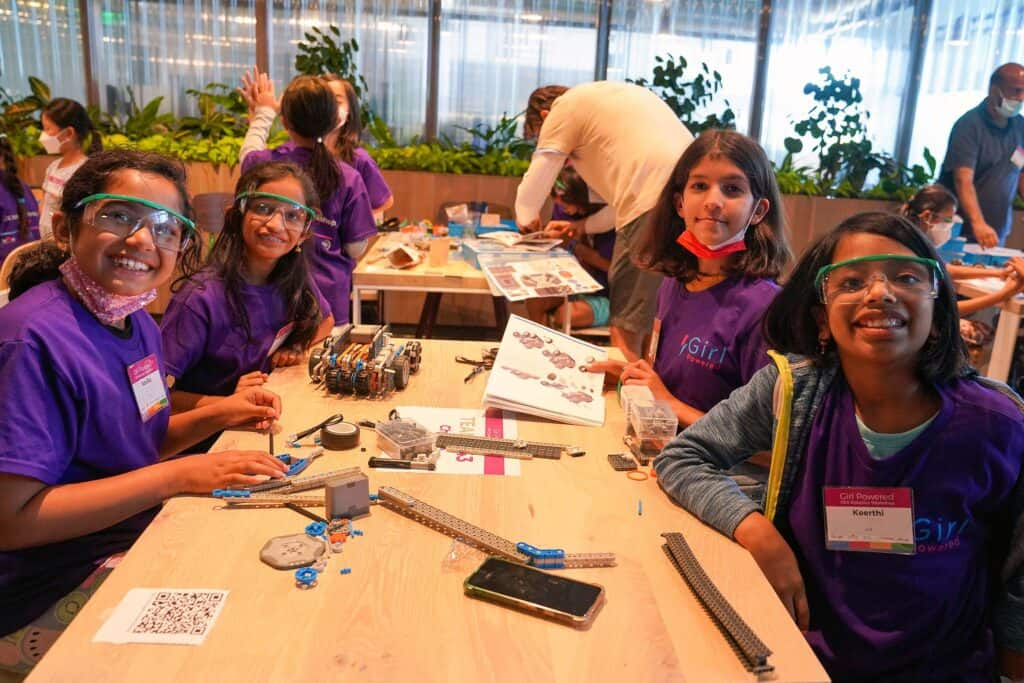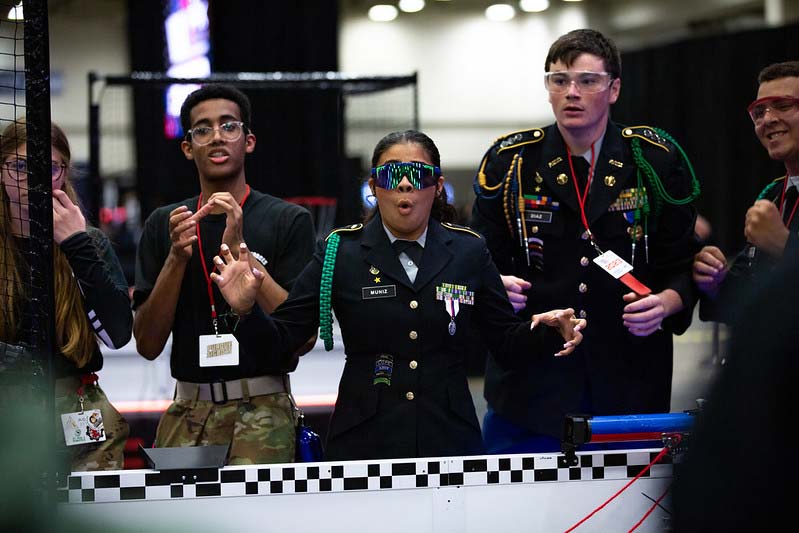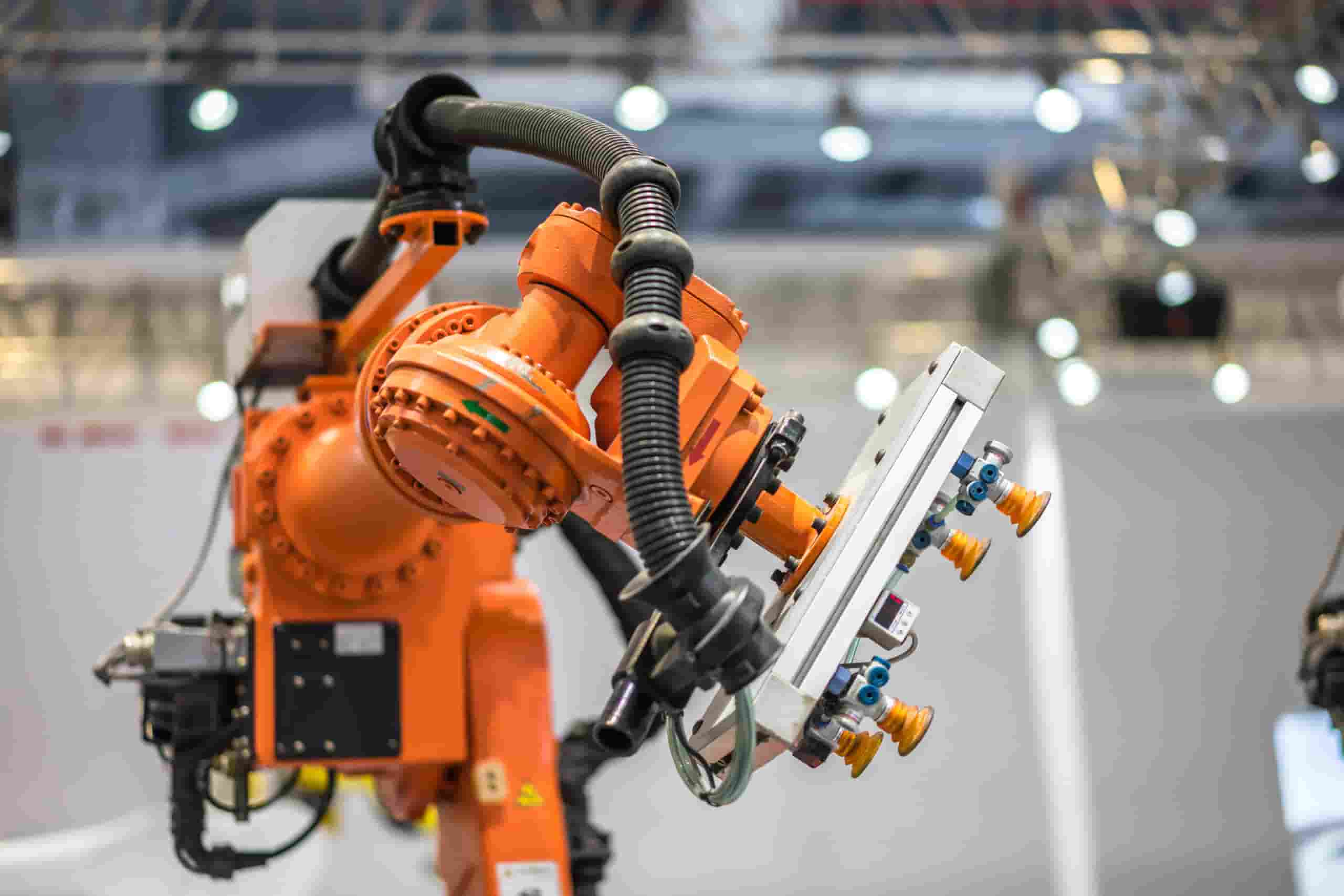
This month’s five questions piece features ARM Institute Member Dan Mantz, CEO of the Robotics Education & Competition (REC) Foundation! Dan’s work sparks interest in science, technology, engineering and math (STEM) by engaging students in hands-on, sustainable, and affordable curriculum-based robotics programs. Dan also volunteers his time on the ARM Institute’s Stakeholder Executive Committee (SEC), which serves as the voice for the ARM Institute membership at-large and works to inform Institute strategies and initiatives.
The REC Foundation has also been working closely with the ARM Institute to help students and alumni from their programs recognize that the skills they’ve learned through robotics competitions primes them for high-value robotics careers in manufacturing! We’re doing this through RoboticsCareer.org, our national workforce resource that connects students and workers to personalized robotics training and job opportunities in manufacturing.
Get to know Dan below!
1. Can you tell us about your background? What sparked your interest in the robotics community?
I started my career in robotics as a Controls Engineer at FANUC in 1993. Over my 20-year career at FANUC, I was fortunate to support robotics integration projects in dozens of manufacturing projects across the world as a Program Manager and ultimately as a Director of Product Development. It was exciting to work on new technologies that improved productivity and helped manufacturing companies compete competitively in the Global Market. It was clear that robotics would be integrated into more industries, not just manufacturing, and that we needed to develop new robotics technologies and training resources to prepare the workforce for this evolution.
In 2016, while the President of Rack Solutions, a Texas product development and manufacturing company, I was invited to join the Board of the Robotics Education and Competition (REC) Foundation. In June of 2017, I accepted the offer to become the CEO of the REC Foundation. It was the REC Foundation’s vision to not only increase student involvement in STEM robotics competitions but to also provide students with workforce pathways for robotics and manufacturing careers. I have been most fortunate that my career has evolved from helping to develop robots and robotics applications to now supporting programs that prepare students for these careers.
2. Can you tell us more about the REC Foundation? I read on your website that the REC Foundation reached more than 400,000 students last year!
The Robotics Education and Competition (REC) Foundation sparks interest in science, technology, engineering, and math (STEM), and computer science by engaging students in hands-on, sustainable, and affordable curriculum-based robotics programs. We seek to inspire and prepare the next generation of innovators and problem-solvers for careers in the technology driven workforce. Just as important as learning robotics skills, students also enhance their career skills, such as problem-solving, teamwork, and collaboration that will help their academic and professional journeys.

This past competition season, over 450,000 students worldwide participated in more than 2,900 events around the U.S. and internationally through both in and out-of-school programs. The REC Foundation’s VEX Competitions is one of the world’s largest robotics competitions consisting of the following programs: the VEX IQ Robotics Competition (Elementary & Middle School), the VEX Robotics Competition (Middle School & High School) and VEX U (Post-secondary). The REC Foundation also runs one of the fastest growing drones competitions, the Aerial Drones Competition, and partners with Bell for the innovative Bell Vertical Robotics Competition. And through the support of ARM funding, the REC Foundation developed and runs the Factory Automation Competition to increase student interest in manufacturing careers.
Each year, we host the world’s largest robotics competition: the VEX Robotics World Championship that showcases extraordinary talent. Last year, more than 30,000 students from all 50 states and more than 60 countries competed at our event in Dallas, TX.
3. How do you reach students and ignite their interest in robotics?
We want to make robotics accessible by making our programs affordable to encourage students from every background to try robotics.
We are fortunate to have an incredible ecosystem of thousands of dedicated educators and schools around the globe that leverage our resources. Students learn so much by building a robot and collaborating with their peers, which ignites creativity and development. This valuable hands-on learning helps build interest and improve technical literacy. To reach these students, we give confidence to educators through training and grants to start robotics programs because the REC Foundation doesn’t just provide robot kits: we work with educators to train them in the process of designing, building, and programming a robot. Often, we partner with whole school districts to establish dozens of robotics teams from various age groups.

We are also focused on providing all educators and students with opportunities with programs designed to make robotics more equitable, such as the Girl Powered initiative powered by Google. Through our Girl Powered workshops, we provide girls an environment where they can explore robotics at their own pace that will enable them to build their confidence on and off the competition field. Teachers, coaches, and mentors can host their own Girl Powered Workshops virtually or in person or learn more information at girlpowered.com.
4. How did you get involved in the ARM Institute?
In 2018, I presented at the RAMTEC Robotics Summit. The ARM Institute also presented at this event. During conversations at lunch, we discussed the REC Foundation’s idea to develop a different type of robotics challenge that simulates industrial robotics in a palletizing application. The ARM Institute responded that they saw a need for this type of program as part of their Education and Workforce Development initiative and invited the REC Foundation to join the ARM Institute and attend the Annual Member Meeting. Ultimately, we submitted a project proposal for the Advanced Manufacturing Competition Program and received a grant. This program, now branded as the Factory Automation Competition, has been a success and is used as part of CTE programs in hundreds of high schools and 2-year colleges across the US.
The REC Foundation feels there is strong alignment with many of our initiatives and we are collaborating on ways to provide the 450,000 students in our programs with access to digital badges, industry certifications, and internships. We enthusiastically support and promote ARM initiatives such as RoboticsCareer.org. I was honored to be nominated and selected to be a member of the ARM Institute’s Stakeholder Executive Committee (SEC), which acts as the voice of the ARM membership. While I am new to the SEC, I look forward to providing insight and ideas on how the ARM Institute can support initiatives to prepare our workforce for the manufacturing and other technology jobs that are in such high demand.
5. Is there anything new or upcoming for the REC Foundation that you’d like to highlight?
One of the most exciting initiatives is our Aerial Drone Competition and the Junior Reserve Officers’ Training Corps (JROTC) initiatives.

The RECF Foundation started the Aerial Drone Competition in 2021 to reach middle and high school students that were not interested in traditional robotics competitions. We have grown from less than 400 teams the inaugural season to over 2000 teams this season. Teams learn about drones, flight principles, programming, documentation, and communication skills while expanding their understanding and building interest for drone-related workforce and career opportunities. Through a partnership with NASA and the U.S. Department of Defense’s DSEC initiative, the REC Foundation hosts a series of competitive drone events for students nationwide each year.
The JROTC Program offers these students critical hands-on learning through robotics that strengthens technical and leadership skills to become well-rounded cadets. The program gives access to the VEX Robotics Competition (VRC) to Air Force, Army, Navy, Marine, Space Force, and Coast Guard JROTC initiatives. Cadets design, build, modify, and program robots in JROTC invitational events and blended VRC competitions. Cadet-lead teams compete throughout the VEX Robotics Competition Season with the goal of attending the JROTC Robotics National Championship.
6. Bonus question: You’ve attended our Annual Member Meeting in years past. Our 2023 Member Meeting will take place Nov. 13-15 in Pittsburgh this year. What value have you found from the event in years past and what are you looking forward to this year?
I have attended the Annual Member Meeting since 2018 and it is one of the events I most look forward to! It is a fantastic way to engage with the entire community and to build relationships with ARM members. In our experience, this has led to partnerships that have helped develop new ideas into programs and increased awareness for these programs.
I most look forward to connecting with other members I have met previously and meeting new members and hearing about the diversity of projects that ARM supports. The ARM Institute always provides informative updates on how the institute is supporting the mission through its programs. I strongly encourage all ARM members to attend the Annual Member Meeting!
Annual ARM Member Meeting
Want to engage with the ARM Institute? Our Annual Member Meeting (Nov. 13-15, 2023 in Pittsburgh, PA) is a great way to kick-start your engagement! This event convenes representatives from across our nearly 400 member organizations for three days of networking, collaboration, and knowledge-sharing. This event is free to attend, but open only to ARM Members. Email [email protected] to learn about joining to attend our event.
Plus, get updates sent right to your inbox! Join our mailing list below.
Join our mailing list
ABOUT THE ARM INSTITUTE
The ARM (Advanced Robotics for Manufacturing) Institute is a Manufacturing Innovation Institute (MII) funded by the Office of the Secretary of Defense under Agreement Number W911NF-17-3-0004 and is part of the Manufacturing USA® network. The ARM Institute leverages a unique, robust, and diverse ecosystem of nearly 400 consortium members and partners across industry, academia, and government to make robotics, autonomy, and artificial intelligence more accessible to U.S. manufacturers large and small, train and empower the manufacturing workforce, strengthen our economy and global competitiveness, and elevate national security and resilience. Based in Pittsburgh, PA since 2017 with a regional office in St. Petersburg, FL, the ARM Institute is leading the way to a future where people & robots work together to respond to our nation’s greatest challenges and to produce the world’s most desired products. For more information, visit www.arminstitute.org and follow the ARM Institute on LinkedIn and Twitter.
